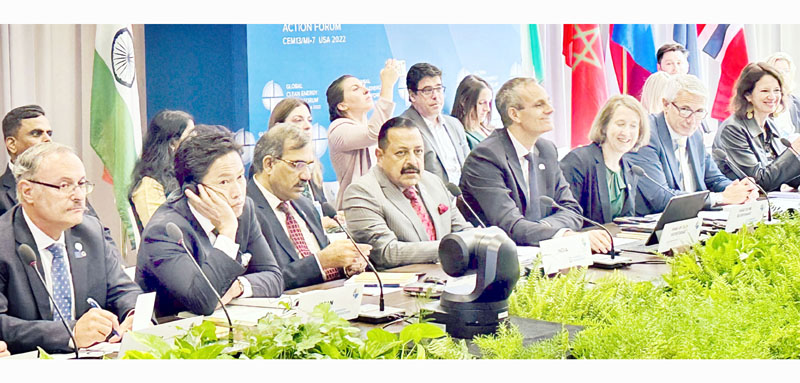
Excelsior Correspondent
PENNSYLVANIA, Sept 24: Union Minister Dr Jitendra Singh has reiterated India’s commitment to a low-carbon future by accelerating clean energy innovations.
Addressing the Joint Ministerial Plenary of Clean Energy Ministerial (CEM13) and Mission Innovation (MI-7) at the ” Global Clean Energy Action Forum 2022″, India’s Minister for Science and Technology, Dr Jitendra Singh said, under the leadership of Prime Minister Narendra Modi, India is seeking to meet the country’s massive energy demand with innovative clean energy innovations and programs. He said, India is committed to achieve 500 GW of installed electricity capacity from non-fossil fuel sources by the year 2030 and reduce the projected emissions by one billion tonnes from now to 2030.
Dr Jitendra Singh, who is leading a high-level Joint Indian Ministerial Delegation of Ministry of Power, New & Renewable Energy and Ministry of Science & Technology informed the Energy and Environment Ministers from 30 countries that India’s energy-mix strategies include a larger shift toward clean energy alternatives, increased manufacturing capacities, energy use efficiency, and a policy push for hydrogen including production-linked incentives. In addition, the emerging technologies like 2G Ethanol Pilot, Comfort climate box for tropical regions, Hydrogen Valleys, Heating and cooling virtual repository, are all on the table, the Minister emphasized.
Dr Jitendra Singh said, India has developed a roadmap and a strategy for a bio-based economy which is inching towards 150 billion USD by the year 2025. He said, this will facilitate infrastructure for bio-manufacturing of low-carbon bio-based products. Recently, India has also launched the National Hydrogen Energy Mission to enable cost competitive green hydrogen production.
Dr Jitendra Singh said, Government of India through Public -Private partnerships is ensuring the funding for clean energy innovations as envisioned under Mission Innovation 2.0. The Minister gave two examples of successful Public-Private partnerships-first one the “Clean Energy International Incubation Centre”, a unique Research and Innovation (R&I) model platform, set up with private partner Tata Trusts, which has resulted in more than 20 clean energy solutions to help standalone researchers, which is a unique achievement. The 2nd one is the Joint Centre of Department of Biotechnology (DBT) and Oil Marketing Companies (OMCs)that led to development of 2G ethanol technology.
Addressing the Ministers & CEOs, Senior representatives of (US DoE), Mission Innovation Steering Committee (MISC) and Mission Innovation Secretariat, Senior representatives from MI Member countries and partner organizations, Dr Jitendra Singh underlined that India is founding and active member of both Mission Innovation (MI) & Clean Energy Ministerial (CEM) since launch and now actively engaged with MI2.0 through various Missions and Platforms.
Dr Jitendra Singh reminded the Ministers and Delegates that Prime Minister Narendra Modi had at the 26th session of the Conference of the Parties (COP26) to the United Nations Framework Convention on Climate Change (UNFCCC) held in Glasgow, United Kingdom in November, 2021, expressed to intensify its climate action by presenting to the world five nectar elements (Panchamrit) of India’s climate action. He said, apart from a five-pronged target for India and its commitment to Net-Zero emissions by 2070, Modi also asserted the need to follow a sustainable lifestyle and emphasized on the idea of making ‘Lifestyle for Environment’ a global mission through bolder steps by the global clean energy fraternity. It is important to realize that transition can only happen with scaling up of green funds in good numbers as committed in the Paris Agreement, the Minister added.

